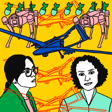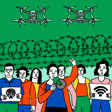Introduction to Season 3: Technology and Development in MENA
00:00:03
Speaker
Welcome to Season 3 of Instant Coffee. I'm Nadine Almanasvi. And I'm Sima Shehab. And this latest season is an exploration of technology and its development in the region. Beyond the emergence of Chet GPT and Sophia the Robot, we wanted to speak with people who are applying, adapting, and reimagining technology in their fields. We will be exposed to medieval Islamic hospitals, failed Gulf techno cities, emerging Iraqi fintech startups, inclusive artificial intelligence, and much more.
Data Grabbing and Protection: Insights from Experts
00:00:33
Speaker
As we're hearing more often, we are in the era of big data. In episode one, Nakimashtafel Bower, on Access Now, told us more about the dangers of data grabbing and how activists in the region can protect their information online as they advocate for change.
00:00:48
Speaker
In this episode, we look at how the collection of data can actually be used for good, specifically in relation to development work in the Middle East and North Africa. Our guest today is Nagla Rizk, Professor of Economics at the American University of Cairo.
Data Collection and AI: Perspectives from Nagla Rizk
00:01:03
Speaker
She speaks to us of the promises and pitfalls of increased data collection, as well as the work of the Access to Knowledge for Development Center at the American University of Cairo.
00:01:12
Speaker
which she is founding director of, and how they are using data and artificial intelligence for good. Nagla's area of research, teaching, and advocacy is the economics of knowledge, technology, and development, which focus on governance of responsible data and artificial intelligence, fair work in the platform economy, innovation, gender and inclusion in Egypt, as well as the wider Middle East and North Africa.
00:01:36
Speaker
Hi, Negla. It's great to have you with us on Instant Coffee and really pleased to be able to speak to a professor from the region who is at the heart of some really exciting data-led development initiatives. Can you tell us a bit about how you got into the field and how you would define your research interests at the moment?
AI's Role in Sustainable Development: Promise and Peril
00:01:56
Speaker
I was trained as an economist. My area of interest is the economics of technology, specifically digital technologies and development, and I have
00:02:06
Speaker
live through the initiation of the internet coming into my country, I live in Egypt, and just living through the developments of what this has meant for me personally and for my country and for my work. The interest was really in this new technology and what it means for me as a researcher for development for sure and what it can do for
00:02:30
Speaker
the potential it can have for achieving the sustainable development goals, you know, food security, reducing poverty, better environment, better climate, better sanitation, better health, better education. There is a potential. We're not saying this potential will necessarily be achieved. And this is something I want to talk more about during our conversation. But there is a potential for this AI for good. Of course, with a promise comes a peril.
00:02:58
Speaker
And I will talk more about this during our conversation.
00:03:01
Speaker
Absolutely. Before we get into the projects that you're working on at the moment and some of the more substantial thinking around the positives and the negatives of data, maybe we could briefly start by breaking down some definitions.
Data Challenges in MENA: Asymmetry and Accessibility Issues
00:03:16
Speaker
So the whole point of this season is to complicate what technology means and data is a big part of that. So how should we understand artificial intelligence and the components that it's made up of? For example, where does data fit into all of this?
00:03:31
Speaker
Data is at the heart of the AI system. It is the basic input, the core, the data sets that are used for training of the algorithms to make the final output of the predictions. And data is, it's really, I call it a mine. And with data come a lot of challenges for communities and especially for us in the case of Mina, if you want to contextualize, you have a whole series of issues and challenges
00:03:59
Speaker
pertaining to data. So on the one hand, there is data asymmetry where you have imbalance in the ownership of data. Usually data is owned by large big tech, large businesses, large companies, as opposed to small players in the market. So data is a source of market power. That's when you look at market concentration, it can actually act as a barrier to entry for some small companies versus the larger players in the market.
00:04:28
Speaker
It can also be a source of out of the state versus the citizen, especially if it's locked, what I call a quote unquote data lock. Ease of access is not available and basically then sometimes even when you have
00:04:41
Speaker
data is available, it is not in a technical-friendly format. So how easily accessible is data in the region for people who wanted to utilize it for a new tech initiative, for example?
Open Data and Innovation: Barriers in the Arab World
00:04:54
Speaker
An older statistic, but indicative, an older source since 2015, the open data barometer produced by the World Wide Web Foundation in 2015 shows that only an estimated 1.48% of data in the Arab world is open,
00:05:10
Speaker
Even though the barometer suggests that 71% of the surveyed government information was available on the internet, there remains technical and or legal barriers to accessing this as machine-readable data. In Egypt, the data for the Central Agency for Public Mobilization and Statistics until recently, a good part of it was available in PDF format.
00:05:35
Speaker
is a barrier for citizens, for civil society, for private business to be able to use data for good. So between the data lock and data inaccuracy, blur, the blindness, the data that's not really available for the public,
00:05:51
Speaker
it becomes a problem for ease of utilization of a fantastic resource for artificial intelligence. One more point related to the Arab Spring when it comes to data, there is also an issue need to revisit methodologies. So if we are looking at the performance of an economy through the lens of GDP growth, then we have a problem.
00:06:14
Speaker
On the eve of the Arab Spring, Egypt's economy was growing at 5.1%. And Tunisia was growing at 3.5%. If that's the only indicator that we have of a wellness of an economy, then we have a problem. And the rest is history, right? So it is very important that when we look at data and we need to have analysis using data that we have
00:06:37
Speaker
not only the right data, but also the right methodologies, including additional and complementary variables to assess an economic situation, if
Responsible Data and AI: Initiatives by the Access to Knowledge Center
00:06:46
Speaker
you will. For example, in that case, it's very important to take note of income distribution, of poverty rates, of geographical inequalities. Inequality in our region is multifaceted, multilayered, and I'm happy to talk more to that.
00:07:00
Speaker
So if this is not noted and not captured properly by the proper lens in as detailed fashion as possible, in a detailed methodology, disaggregated, granulated, then this is when you have proper data, then you're really able to utilize your technology for good.
00:07:21
Speaker
That is a really interesting point on the Arab Spring. What effects do these different limitations in relation to data collection and analysis have on the outcome of a tech initiative? Lack of quality data feeds into the algorithms. And then if the algorithm uses already faulty data, that's already a problem.
00:07:43
Speaker
Now, if also the algorithm has its own issues, then it adds another layer of challenge. So algorithmic harms can happen. Biases existing in the design of the algorithms themselves, they're designed by technologists, reflecting biases by people, reflecting their own real world biases. Examples are credit rating algorithms, for example. They include data on neighborhoods.
00:08:07
Speaker
And this is used as a collateral, sometimes hiring and function algorithms. Women will go on maternity leaves. If the algorithm only looks at points of people who offer hours of work without consideration.
00:08:21
Speaker
of their other additional circumstances. In right sharing, for example, algorithms in right sharing will give bonuses to those who put in a lot of hours. But if the hours are less because of women's working conditions, then this will translate into the algorithm. All of these, I mean, between data challenges and the algorithm itself, if it's not sensitive,
00:08:41
Speaker
to the right data and if the algorithm itself is designed by technologists or only by some group of people who may have their own biases and who may not see the full picture this could be challenging and then of course over time the algorithms will get to train themselves and this kind of bias will be magnified.
00:09:04
Speaker
with this really illustrative background that you've provided us on data. Let's talk a bit about where the research center that you head, the Access to Knowledge for Development Center, where does that fit into the AI and data scene at the moment?
00:09:17
Speaker
At the Access to Knowledge for Development Center, we're very excited to be launching the Mina AI Observatory. And here, we would like to think of AI, despite all the challenges that I spoke about, we would like to look at the raise of hope. So the observatory is an interdisciplinary platform.
00:09:36
Speaker
where we connect policy-oriented researchers, innovators, startups, civil society, students, everyone who is looking for collaboration and building capacity for responsible data and AI.
00:09:51
Speaker
practices. So at the center, we have been engaged in over the past few years in research on first data for development that has evolved into governing responsible data and AI for development. We've also been engaged in research on new forms of work, platform work, trying to develop a nuanced narrative for the MENA region, looking for opportunities and connecting people in that regard.
00:10:20
Speaker
The observatory is to serve as a virtual hub for capturing and disseminating knowledge and research produced by many researchers, ourselves, our partners and others.
Empowering Gig Workers and Entrepreneurs: Inclusion Efforts
00:10:31
Speaker
It should be the go-to place to find material and to interact and engage with the network and community working in this area, creating an interactive research database in both English and Arabic. The idea here is to have a locally driven observatory.
00:10:46
Speaker
that serves as a knowledge resource, networking, catalyst for change, that champions Mina voices. Very important, the voices from the region, from the ground. The purpose is to be transformational, provide evidence-based research, advocacy for policy impact for multiple stakeholders, and at the end of the day, providing the voice of the region in the global
00:11:08
Speaker
connecting with other partners within the region, but at the same time reaching out to other global observatories in the north, in the global north and the global south.
00:11:19
Speaker
What kind of projects and sectors are you working in at the moment? As I mentioned in our work at the center, we are doing a series of research work in Egypt and in the region with wonderful partners in the region studying gig workers, cloud workers, usually cloud workers have higher skills. People will do translation, architecture, design online through the platform work as well.
00:11:44
Speaker
We try to improve the working conditions for all of these workers and to prepare the young... People talk of a youth bulge, but bulge is a negative, has a negative connotation. I don't want to say a youth bulge. I'd like to say a wealth of youth. How can you invest in that wealth of youth to prepare the region for the future? This is the priority also
00:12:07
Speaker
One project that we're also very proud of at the center, we work with women digital entrepreneurs, informal, who sell their work through Facebook, WhatsApp online. And what we're trying to do is help policymakers see those women without their intimidation. So they, you know, we don't want the women to be intimidated to be included because they will be taxed. So they can give them, we're working with them to give them tax breaks. So they include them in the work.
00:12:34
Speaker
force, we help them develop their own entrepreneurship, their own livelihood. So the first thing is really to work with people of the region to utilize the technology and move forward. This is the priority for the region, in my opinion. Of course, it is also very important to take note of the
00:12:55
Speaker
governance of the data and AI responsibly to lay out the framework. And there have been some initiatives in the region. Egypt has a charter on responsible AI. I know that Saudi Arabia has also taken steps in this regard.
00:13:10
Speaker
One example also that we are proud of is we are the mean hub for feminist AI. So we support researchers to develop solutions, transformational solutions using AI for inclusion for women and other groups. So one example with our partner researcher is developing an educational, a smart education system using artificial intelligence for girls in upper Egypt.
00:13:35
Speaker
insight. The model is when you have one classroom school for girls of different ages, so they need to learn using personalized teaching techniques, given their age is different, and learning mathematics in Arabic, which is a fantastic project by our partners. We also work with partners in Egypt and the region on governance of data and AI,
00:13:56
Speaker
in the health sector and for food security in MENA. So these are examples, very simple examples of using the technology for good. There is also the contentious gig work, which usually comes at subpar working conditions globally, of course, because gig workers are narrowly defined as ground-based
00:14:17
Speaker
gig workers that drive right-sharing, so-called right-sharing and the likes. Typically, these are not foreign employees, so they would not have benefits, they would not have social insurance, they would not have health insurance. Because this kind of work, this tends to keep them outside the data landscape of the countries. In that sense, this kind of work is not considered fair. To put it positively, there is potential for improvement of the working conditions of
Data Invisibility: Impact on Gig and Informal Workers
00:14:47
Speaker
of workers. Nevertheless, in countries like Egypt and in other countries of the global south, this kind of work actually offers an alternative to the harsh economic conditions. Egypt in particular has high inflation rate. We are facing harsh economic conditions at the moment.
00:15:05
Speaker
So finding work is an opportunity to offer a livelihood for people. But then we'd like to, and this is part of our research at the center, where we work with the gig workers, with policymakers, and with actually the CEOs of the platforms to improve the working conditions of gig workers. So we would like to
00:15:24
Speaker
think of this as an opportunity to offer livelihood and improve the working conditions and improve that actually include them in the national data landscape. We are working, this is part of our research at the center to include big workers in the labor market survey. So they're actually part of the data landscape. They are seen and they are addressed as such as part of the labor force.
00:15:49
Speaker
And is this data invisibility something specific or unique to gig workers? The issues with data invisibility pertain to gig workers for sure, but also it goes beyond gig workers to include communities that are invisible to the national data landscape. For example, informal dwellers, informal workers,
00:16:10
Speaker
not just gig workers because gig workers at the end of the day work for companies that exist so they are not typically informal workers but you can also think of people who are working informally in farms and in homes you know even in the
00:16:28
Speaker
actual formal sector does employ workers informally for whatever administrative reasons. These people, if they are not properly included as workers in the national data landscape, they will fail to receive policy attention. I call it data blindness, if these people are not seen by the lens of the state policy.
00:16:49
Speaker
Related to this is what I call data blur, which results from aggregation that clouds out granular details. A typical example of that would be granulation by gender. Such this aggregation is very important for the data to be accurate so that it is translated once used by the technology, by the algorithm.
00:17:10
Speaker
It is translated to accurate and useful results. These probably very much exist in the region. So these communities need to be properly documented in the system, in the national data landscape.
Equitable Technology Use: Addressing Inequalities with AI
00:17:24
Speaker
I have a nice example from Egypt about the invisibility, about the data, if I may.
00:17:30
Speaker
So in times of COVID, there was a handout by the state for informal workers, an amount of £500, because of course their livelihood was affected. There was an estimate of 2.5 million workers. This was the figure that was seen by the state. According to research records, this represents 12.5% of 20 million informal workers.
00:17:55
Speaker
Now, again, to qualify for the handout, you had to fit a certain category on the ID. If you had an irregular work, you qualified. But if you did not have, you have no work on your ID, you do not qualify for the handout. So that's first layer.
00:18:13
Speaker
Then the application was announced online in a country where you still have rates of illiteracy and not even digital illiteracy. People who may not be able to read and write, let alone digital illiteracy and digital divide and access to technology. So that's another layer of
00:18:32
Speaker
barrier to access. And the reimbursement was made via smart cards at the ATM, at the automatic teller machine. So that's another layer. And the word categories that were on the form were carpenter, welder, and immediately in the region, you know that these are jobs taken by men. So if you just count the layers of exclusion for women in the informal sector,
00:19:01
Speaker
They're not seen, they're just not there. They're invisible to this, you know, to this very kind and noble cause and objective that is hampered, the objective of which is hampered by the problem of data. It's a very simple example, you know, nothing AI, but it is at least an example of how taking note of the importance of data as a starting point when we talk about technology.
00:19:28
Speaker
In a few of our episodes, we've ended up talking about uneven development in relation to technology and how sometimes it can just exacerbate existing inequalities and potentially create new ones, which you have spoken about a bit. How do you prove or convince to someone who's a bit critical of the idea of utilizing AI for good that it is effective and it is worth doing? Absolutely.
00:19:51
Speaker
Yes, let me, if I may, just speak to the threats because moving forward means taking heed of the note of the threats. Again, as I mentioned, the MENA region has multifaceted inequality, layers of inequality, inequality of opportunity and access to education, health, employment, living conditions, active citizenry,
00:20:15
Speaker
inequality in digital use and access, digital divides, amplifying analog divides, intersectionality, cutting through realities of minorities and underprivileged groups. It's a reality that we do have this inequality. And we also have unique demographics. We have more than half our population youth, less than 30 years of age. This is a very loose statistic. Sometimes people less than 25, less than 30.
00:20:45
Speaker
The reality is within this population, we also have the highest global rates of unemployment of women, the highest global rates of unemployment of youth, and the lowest global rates of labor force participation for women. This is a context that we have to keep in mind when we think of technology. So I find myself when I write about technology, I start by this, by the demographics.
Balancing AI's Impact: Challenges and Civil Liberties
00:21:11
Speaker
It's a very young little region.
00:21:13
Speaker
It has its own unique demographics and this touches immediately on the future of work. Immediately. So basically, when people think of a word that people will be replaced by a machine, the saying goes, any job that can be replaced by a machine will.
00:21:32
Speaker
So, in the discourse on artificial intelligence and work, we need to distinguish between technology that's enabling and technology that is replacing work. You would want, in this part of the world, to encourage technologies that enable work. So, in medicine, you want technology that helps healthcare, you want technology that helps agriculture, etc.
00:21:56
Speaker
Sadly, the kind of jobs that are to be replaced by machines, the kind of skills that are to be replaced by machines are the skills that we have.
00:22:08
Speaker
And as we wrap up, what has been a really fascinating conversation? What would you like listeners to take away from this? How should we understand the development of AI in the region? What are some of the most important challenges that startups and young entrepreneurs are facing? What do you see the future looking like for those who are trying to utilize technology for good in the Middle East and North Africa?
00:22:32
Speaker
There are three tensions really shape the discourse over AI and inclusion, in my opinion.
Building Human Capital: Skilling for a Digital Future
00:22:39
Speaker
First is this paradox that I just talked about, the potential for promise and peril. So we need to be very careful how to address the peril and how to prepare to be transformative and not wait for the negative outcomes.
00:22:55
Speaker
The second challenge is technological determinism. The apparent insistence sometimes on investing only in the technology and everything else will follow, which has proven not successful. And the example is Egypt pre-Arab Spring, the investment in the technology backbone in the 90s that brought fantastic growth rates, sometimes reaching 7%
00:23:18
Speaker
But guess what, both extreme inequality that eventually ended up in the uprisings of January 2011. And the third tension is paying attention to civil liberties along economic freedoms so that hand in hand the technology can be properly used to reflect all voices, represent all voices with no one left behind. So the number one
00:23:45
Speaker
thing to do is to invest in human capital. Skilling, re-skilling, up-skilling, what I call cross-skilling. So you need to really train people in different domains on simple technology and vice versa. So you need to get to cross that line between silos and skills. We have plenty of
00:24:06
Speaker
young, energetic people who really, really, really are eager and thirsty to learn. And if we think again that we have unemployed university graduates, this is painful.
Regional Collaboration: Leveraging Diversity for AI Development
00:24:18
Speaker
The number one thing to invest and to take heed of is not the technology, it's the people.
00:24:23
Speaker
In order for the technology to work, that's very, very important. And to provide people always talk of safety nets for people who will lose their work. Sure, we should think of safety nets, but what is more exciting is to think of how we can invest in livelihood for people, people to find their own livelihood. Not only a safety net to help them to pay their bills, but how can we develop their skills to have their own livelihood, their own businesses, their own
00:24:54
Speaker
you know, development, self-development. This is really the priority. Part of the narrative of AI and work and youth in the region is actually the need to retain our, you know, educated human capital. And the sad reality is
00:25:13
Speaker
what sometimes can end up, and this is also based on evidence in the ground, interviewing AI companies in Egypt, that it's the difficulty to retain human capital who are attracted to work elsewhere, sometimes in the global north, sometimes even within the region, the Gulf countries who are, of course, more advanced
00:25:33
Speaker
in the use of technology and the opportunities and a friendly business environment. So I guess one hope I would love to see, you know, take place is across the region, given the diversity in the region is maybe more complementarity than competition.
00:25:50
Speaker
As a region, while there is diversity and variation, it can be looked at as a complementarity with countries that are high in human capital versus other countries that import labor and human and skilled capital. So it would be nice to see collaboration on that. And especially that at the end of the day, the region does have commonalities, the common culture. So there is great potential to use AI for good.
00:26:19
Speaker
and to also work together on trying to transform and avoid and correct biases and address negative issues together rather than being competitive, especially when it comes to human property. Thank you for listening to Instant Coffee, a podcast brought to you by the LSE Middle East Center. Join us every other Tuesday for a new episode. And don't forget to follow us on your favorite streaming platforms,




















